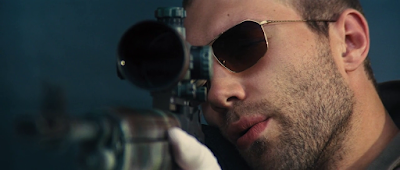'Harry Potter and the Half-Blood Prince' Review
Harry Potter and the Half-Blood Prince is the sixth chapter in Harry Potter's magical life at Hogwarts School of Witchcraft and Wizardry and subsequently the darkest yet as the franchise matures with it's characters. In Half-Blood Prince, Headmaster Albus Dumbledore and Harry Potter seek to uncover Voldemort's past for the key to defeating the Dark Lord. In his learning Potter gets a hand-me-down used Potions book previously owned by the mysterious "Half-Blood Prince" that enables him to excel in Potions class so that he can get close to the new Potions Professor, Slughorn, who just so happens to unknowingly hold information imperative to destroying Voldemort.
Half-Blood Prince is helmed once again by David Yates, who will carry out the remainder of the series, and it's evident that Yates has inhabited himself in the Wizarding World, understanding these characters and the best ways to convey their elaborate emotions. Yates knows the appropriate moments for despair, when to lighten the mood, and best of all exploring the intricate mind of a teenager.
Yates and director of photography Bruno Delbonnel frame beautiful escapist shots of the Hogwarts castle, the somber skyline, and know exactly when to let the camera linger. The visual effects, practical effects, and scenic design are once again a remarkable feat and this time I actually can't point out any weaknesses as the one Quidditch match and predeceasing tryouts looked the best it ever has, the magic spells continue to evolve becoming more fluid and visually dynamic as the series progresses, and the filters and effects used to dive into Dumbledore's Pensieve evoke the right balance of mystery and clarity, paralleling Harry's exposure into discovering Voldemort's past life.
Steve Kloves returns to adapt Rowling's sixth novel, after taking a break from The Order of the Phoenix, and sensibly selects the integral story arcs while discarding the extraneous bits of information to shape a well balanced screenplay. Kloves adds in some small pieces here and there to intrigue the viewer and help them understand a few ongoing developments left absent in the novel. There are a few holes occasionally that non-readers may scratch their heads over but for the most part these are few, far between, and don't impact the plot too heavily.
Nicholas Hooper proves once again that he's more than capable of taking up the mantle from the brilliant John Williams of composing a spellbinding score that is able to put you on the edge of your seat, evoke joy, and even bring you to tears. As the case with the preceding entries, the cast elevates the material to new prominence.
Daniel Radcliffe's Harry Potter becomes increasingly more complex as he matures considering all he's been through and Radcliffe handles the matured material elegantly. Of course his chemistry with Emma Watson's intellectual Hermione Granger and Rupert Grint's blundering Ron Weasley is magical. Bonnie Wright gets more time to shine as Ginny Weasley now that Harry has a crush on her and their romantic subplot flourishes when touched upon.
Michael Gambon turns in his best go at Albus Dumbledore yet getting to explore some vast range towards the film's conclusion whilst bringing a natural stately presence about himself. Elsewhere, Jim Broadbent makes a fine addition to the cast as the sleazy Professor Slughorn and Alan Rickman is superb every moment on screen as the cold calculating Severus Snape, really selling his big reveal and actions that only foreshadow the coming of the truth in the final installment.
Tom Felton's Draco Malfoy is no longer the snide remarking kid, this time actually getting to touch upon glimpses of true evil revealing his true nature in the process. Helena Bonham Carter, Dave Legeno, Helen McCrory, and Timothy Spall make up the Death Eaters as the wicked Bellatrix, the fierce Fenrir Greyback, the vain Narcissa Malfoy, and the squeamish Wormtail.
Many of the other students, teachers, and allies who typically had a more crucial role in the series are relegated to the background to bring more focus on the important matters at hand, oddly paralleling the matter of growing up to a tee.With this being said, Maggie Smith, Robbie Coltrane, David Thewlis, Natalia Tena, Julie Walters, Mark Williams, Matthew Lewis, Evanna Lynch, and last but not least James Phelps and Oliver Phelps are all to be found sparingly as Minerva McGonagall, Hagrid, Remus Lupin, Nymphadora Tonks, Molly Weasley, Arthur Weasley, Neville Longbottom, Luna Lovegood, and the pesky Weasley twins Fred and George respectively.
The Half-Blood Prince offers the best the franchise has to give in all departments and is certainly one of my favorites in both cinematic and written form. In summation, Harry Potter and the Half-Blood Prince is a tremendous show of phenomenal filmmaking that chooses to focus it's efforts on character investment rather than grand spectacle, doing justice to the source material thanks to capable direction, wondrous effects, a fascinating score, and an extraordinary ensemble cast.






















































